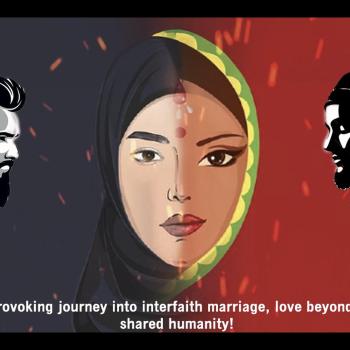Bicycle Thieves (1947)
Directed by Vittorio de Sica: Perhaps the greatest of all "Neo-realist" films, it tells the all-too-human story of a family, particularly a father and his young son, who suffer unemployment in postwar Italy. When on the first day of his new job his bike is stolen, the bike on which the job depends, he in turn steals another and is caught. A simple story, yet so movingly told that it evokes, even from the most hard-hearted of us, the sympathy for others that the Church and our Lord desire.
Blue (1992)
Directed by Krzysztof Kieslowski: This film is part of a trilogy, the other two being White and Red. Beautifully photographed and supremely intelligent, it tells of a woman (Juliette Binoche) who, after losing her husband and child, attempts to withdraw from life. But suffering and truth bring her back, with greater understanding, to a more meaningful existence.
Casablanca (1942)
Directed by Michael Curtiz: Let's be honest. Although this is a typical studio work, reluctantly acted, improvised as it went along, it's one of the most enjoyable pictures ever made. It's not just Bogie at his best, Ingrid Bergman at her most appealing and vulnerable, and Claude Rains at his wittiest; it's not just Peter Lorre, Sidney Greenstreet, and a superb cast; it's not even World War II and "As Time Goes By." No, what makes Casablanca a great film is that all of these contribute to a story of conversion and sacrifice, in which the big, cynical ego of Rick surrenders itself to a higher cause. In any roundup of suspects for great cinema, Casablanca must be included.
Ben Hur (1959)
Directed by William Wyler: My favorite scene: As Jesus gives water to the enslaved Ben Hur (Charlton Heston), a Roman guard starts to say, "Who do you think you..." and looking into the face of God cannot finish his sentence.
The Champ (1931)
Directed by King Vidor: If City Lights fails to make you cry, The Champ certainly will. An over-the-hill, drunken prizefighter (Wallace Beery) deliberately alienates his loving son (Jackie Cooper) so that the kid will have a better life with his upper-class mother, then wins his last fight for the boy, knowing his own life is at risk. Not unlike the theme of Vidor's later Stella Dallas, this film, while remaining positive, captures the ambivalence and problems in parent-child relationships. Many '30s films take on these Dickensian subjects, not the least of which are the early ones starring Shirley Temple.
Chariots Of Fire (1981)
Directed by Hugh Hudson: In the spirit of Ut Unum Sint, we should acknowledge at least one Catholic film with a Protestant orientation. Such is this epic of the 1924 Olympics, in which Harold Abrahams (Ben Cross) overcomes anti-Semitism, and Eric Liddell (Ian Charleson) sticks to his religious convictions. Happily, the Flying Scot gives full credit to God for making him the fastest man alive.
El Cid (1961)
Directed by Anthony Mann: By far the best of the medieval epics.
City Lights (1930)
Directed by Charles Chaplin: The Tramp falls in love with a blind flower girl and sets out to raise money so she can afford an operation. For his efforts, which include a supremely comic prizefight, he's falsely accused of robbery, but not before he gets the money for her cure. When he returns, down and out, ridiculed by nasty boys, she sees him from her prosperous new flower shop, laughs at him, and gives him a rose. In touching him, she recognizes that he, not a millionaire, is her benefactor. The last shot of the Tramp, with the rose in his mouth, is nothing less than a representation of divine love, a figure of one rejected by men who unselfishly saves us.
Un Condamné à Mort S'est Échappé (1956)
Directed by Robert Bresson: All of Bresson's films qualify for a best Catholic list. This one stands out because it dramatizes the interaction of free will and providence as a man condemned to death escapes from prison. Austere and meticulous in its details, it becomes a breathtaking allegory of Christian life.
Diary Of A Country Priest (1950)
Directed by Robert Bresson: Austere and profound, like the Bernanos novel on which it is based, this film presents the daily struggles encountered by a sympathetic priest.
Going My Way (1944)
Directed by Leo McCarey: A sentimental favorite. Earlier Hollywood films about priests worked, like this one, to show they are regular guys and good social workers. Here McCarey has not yet lost his comic touch, and he uses it to convey some genuine spiritual truths, aided by a fine performance from Bing Crosby. If Pope Pius XII enjoyed Barry Fitzgerald taking a snip of whiskey, who am I to complain? It was followed by an even more popular sequel, The Bells of St. Mary's (1945), also directed by McCarey.




